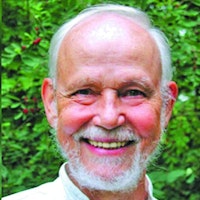Do not we, too, need to cultivate—I shall not say the habit of religion, but the habit of God?
Huston Smith

The Habit of God
Topic: Interfaith Pathways
During these days I have found my thoughts returning to a phrase that Jacques Maritain, the Neo-Thomist philosopher of a generation ago, made familiar to me. In speaking of art, he would come around to what he called “the habit of art.” Artists, he would say, need not merely to paint, or sculpt, or sing. They need to cultivate the habit of art in their entire lives. Is it different with us who have religion as our core concern? Do not we, too, need to cultivate—I shall not say the habit of religion, but the habit of God?
Huston Cummings Smith was an influential American scholar of comparative religions, best known for his accessible and insightful writings on the world's major religious traditions. Born on May 31, 1919, in Suzhou, China to missionary parents, Smith spent much of his early life in an environment deeply infused with religious and cultural exchanges. This formative experience undoubtedly laid the foundation for his later work in religious studies. Educated at Central Methodist University and the University of Chicago, Smith embarked on an academic journey that saw him teach at various reputable institutions, including Washington University, the Massachusetts Institute of Technology (MIT), Syracuse University, and the University of California, Berkeley.
Smith's most celebrated work, "The World's Religions," originally published in 1958 as "The Religions of Man," has been a staple in comparative religion courses for decades. The book presents a comprehensive overview of the world's major faith traditions, including Hinduism, Buddhism, Confucianism, Taoism, Islam, Judaism, and Christianity, elucidating their core tenets, practices, and histories. Smith's gift was his ability to distill complex religious concepts into engaging and approachable narratives, making them accessible to a broad audience. The book's success—evidenced by its sales of over three million copies—attests to its enduring appeal and Smith's prowess as a writer and educator.
Throughout his career, Huston Smith emphasized the importance of understanding and appreciating the diverse religious landscapes of the world. He believed that at the heart of every religion was a perennial philosophy—a set of universal truths—that could foster mutual respect and understanding among people of different faiths. Beyond his written work, Smith was an avid proponent of interfaith dialogue and was often sought as a speaker and commentator on religious issues. He passed away on December 30, 2016, but his legacy endures through his contributions to the field of religious studies and his tireless efforts to promote a more harmonious and interconnected world.
Assembly of the World's Religions
Bryant, M. Darrol., et al. Assembly of the World's Religions, 1985: Spiritual Unity and the Future of the Earth: a Report,1986, p. 220 [Dr. Huston Smith, Farewell Banquet Remarks].

Huston Smith
Theme: Interfaith Dialogue

About This Huston Smith Quotation [Commentary]
Huston Smith’s quotation, “Do not we, too, need to cultivate—I shall not say the habit of religion, but the habit of God?” invites reflection on spiritual practice. By referencing Jacques Maritain’s idea of “the habit of art,” Smith encourages us to see spirituality not just as rituals or beliefs but as a way of life. This idea challenges us to go beyond the surface aspects of religion and embody a continuous experience of the divine presence. Smith suggests that, like artists who internalize their craft, individuals must cultivate an awareness of God to live a truly spiritual life.
Smith’s passage distinguishes between the habit of religion and the habit of God. Religion often involves practices that can become routine, while the habit of God implies an ongoing, personal relationship with the divine. This aligns with many spiritual traditions that encourage a direct connection with the divine. The habit of God involves an inner transformation that shapes our perception and interaction with the world, beyond just following religious practices.
In interfaith dialogue, Smith’s insights are especially relevant. The habit of God transcends specific religious doctrines and rituals, promoting a universal spirituality that can bridge different faiths. This approach fosters mutual understanding and respect among various religious communities by focusing on the shared experience of the divine. By cultivating the habit of God, individuals can help create a more harmonious and inclusive world, recognizing spirituality as a common thread that unites humanity.
The Habit of God
“When it is alive, religion is something in which the whole personality participates, the unconscious as well as the conscious parts of our being. At its fullest and best, religion is the habit of God, and like other habits, it must be rooted deep in our being. Habits have to be cultivated over long periods of time through experience and training, and training in religion is largely a matter of developing the habit of God. This is more than a discipline, though surely that is involved. It is a way of looking at the created world, and of using the senses to see – concretely see – the world not just as pointing to God, but as drenched with the fullness of the Divine Presence.”
–Dr. Huston Smith [Farewell Banquet Remarks, The Assembly of World’s Religions (November 15-21, 1985)].
Related Quotes
Copyright © 2017 – 2026 LuminaryQuotes.com About Us